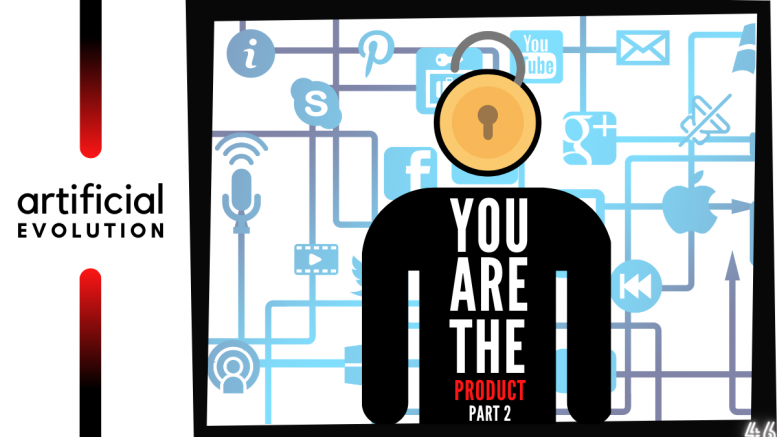Hello reader,
This is part 2 of the essay – You are the product.
In part 1, we laid down context to internet privacy, the role it plays in our lives and the level of integration it has achieved. As the perfect segue:
A short guide on protecting your internet identity
As users, creature comforts like auto-logins and saved passwords made it much easier to become ignorant about privacy.
Convenience became priority. Privacy became optional.
To quell this, the author proposes a simple guide to keep your data private. All except the last one, are free. Ranges from lazy to PARANOID:
- Lazy: Cookies are probably one of the most ignored component of your day-to-day internet use. Popular websites install these to analyse data packets sent and received by your devices. It’s pretty much automated to an extent where you don’t even know it’s happening. So try this:
Use Ghostery: An extension that tracks cookies of multiple websites. Cookies are basically pieces of code that maybe common or proprietary to websites. It’s a wee ‘software device’ that installs itself on your machine so the website knows when you connect again, what you do and potentially changes or modulate search results for that website for specific users. When you download the Ghostery extension, the little ghost icon lights up whenever you visit a website and allows you to physically disable cookies. Furthermore, once a particular cookie is disabled, it stays disabled for any all websites that might use it. Try it when booking flights. You’ll be surprised.
- Basic: Popular search engines (including the six letter word we use as the generic term for the searching something on the Internet) track us in more ways than one. They offer a free service and request your personal data to send to advertisers so targeting is crisper and more to the point.
Getting out of an eco-system is tough. Especially when your email, cloud storage, news and social media accounts are connected. To at least change the way you search, there’s DuckDuckGo.
DuckDuckGo is a search engine founded specifically to not track you. That’s probably their only claim to fame. The biggest advantage DuckDuckGo brings is search uniformity i.e. every user gets the same result for queries and NOT TAILORED to their individual behaviour and browsing pattern.
Advanced: The browser market is booming. Chrome, Firefox, Safari and Opera make up the lion’s share of the market. None of them however offer truly private browsing. Incognito mode is not private. Next time you open an incognito tab, read the column on the right titled: ‘Your activity might still be visible to’
Use TOR (The Onion Router): As an OpenSource project, TOR is probably the most famed tool for anonymous browsing on the internet. To put it simply, TOR uses bait and switch. Ever noticed in the movies when they say “They’re using a ‘private server’ that keeps jumping geographies and we can’t track their official source”?
TOR is somewhat like that. As the name suggests, imagine the cross section of an onion. Beam in information from the left and think of each layer of the onion as a layer of refraction. Each layer allows more complexity and increased anonymity (unless someone is really trying to find you through IP address mapping and/or your existing email ID/password). When information passes through the central TOR node, it again goes in through the same process of multiple refraction and makes a temporary Hall of mirrors that allows your browsing to be encrypted.
There is one trade-off though. Due to the structure of TOR’s architecture, its not as snappy as the other browsers. However bonus: It comes bundled with DuckDuckGo.
Read more about the formation, history and purpose of the TOR project here: The Transparent Internet
PARANOID: If you’ve ever watched YouTube videos that are tech or tech education related, you may have heard of a VPN.
A Virtual Private Network is basically like a wireless mesh integrated into your computer. Usually sold as a subscription service with rates between USD 2 to USD 5 per month, VPNs allow you to reach levels of anonymity where it is near impossible to track your browsing or data via the internet. How did a lot of users play PUBG on mobile after it was banned? VPN.
How to access data from Netflix/Prime/YouTube that may not be avalaible or blocked in your country? VPN. How to rebel against an authoritarian government who wished to admonish and shut-down free speech? TOR coupled with a VPN.
Its not about just personal preference
To get real for a second, Internet anonymity is not personal preference anymore. Think about the network effect. Your actions of uploading images and/or data about your friends, co-workers, corporations or other entities needs to be set with priority. Relook at the way you use the internet. Even if you don’t do anything wrong, others may not share your nobility when they have your data.
Be practical. Be protected.
The views and opinions published here belong to the author and do not necessarily reflect the views and opinions of the publisher.



Be the first to comment on "You are the product – Part 2"